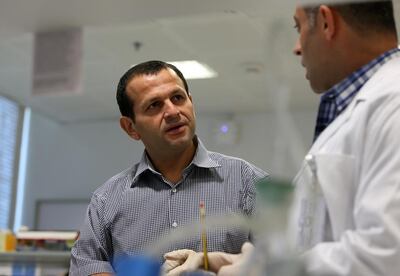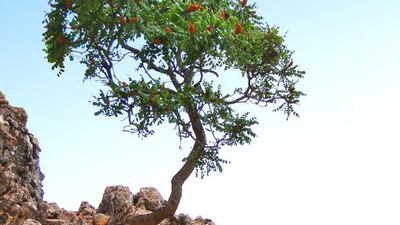The tree Rhus coriaria, which grows in parts of the Arab world including Jordan, has long proved useful to people in this region.
Its oil can be turned into candles, its pigments are used as dyes and its fruits are crushed to provide spices.
UAE research has now highlighted properties that could be more significant than all of these: extracts of the plant have strong anti-cancer properties.
In a new study in the journal Scientific Reports, Dr Rabah Iratni, an associate professor at UAE University in Al Ain, and a number of co-researchers have found that these extracts can kill colon cancer cells.
In their paper, the researchers say that the extracts “significantly inhibited the viability and colony growth of colon cancer cells”. Through their influence on biochemical pathways, the extracts also induced processes called autophagy and apoptosis, which both involve cell death.
The researchers concluded that R. coriaria extracts were "a potential and valuable source of novel therapeutic anti-cancer drug".
Also known as bowel cancer and colorectal cancer, colon cancer is the fourth-largest cause of cancer deaths worldwide and each year about 50,000 people lose their lives to the condition in the United States alone.
As reported in The National in 2016, Dr Iratni's research group has previously found that R. coriaria extracts can kill breast cancer cells.
Treatments that may result from the use of these plant extracts are likely to be a number of years away at least, but the findings offer promise for the future.
_____________
Read more:
Discovery of new types of diabetes is transforming treatment of the disease
Is there a way to make cloud seeding more effective?
_____________
Given the findings with breast cancer cells, Dr Iratni said the results with colon cancer cells “did not come as a surprise”.
Nonetheless, he was “very pleased” with the findings.
“I really expected it would have such an effect with colon cancer. Right now we’re working with lung and prostate cancer as well. It’s getting a very interesting effect,” he said.
The researchers hope to identify the compounds in R. coriaria, which is also known as sumac, that kill the colon cancer cells.

The plant contains more than 200 substances, but through computational analysis, the researchers have identified those that might be targeting processes involved in the death of the cancer cells.
“The next step is to fractionate and see which fraction is mediating this effect,” said Dr Iratni.
Dr Justine Alford, a senior science content officer at Cancer Research UK, said the latest findings were “interesting”, but cautioned that “a lot more research lies ahead before the approach could be tested in people with bowel cancer”.
“Most importantly, the researchers haven’t shown that eating the spice has any effect against cancer,” she said.
“Some important cancer drugs we use today have come from plants, such as the chemotherapy paclitaxel. So it’s possible that early research like this could lead scientists towards other effective treatments in the future,” she said.
As well as working with sumac extracts, Dr Iratni and his colleagues have previously discovered anti-cancer effects from other plant extracts.
About five years ago they published findings showing that extracts of the herb marjoram, which has the scientific name Origanum majorana, can kill breast cancer cells in the laboratory.
Such research raises the question of why plants produce chemicals capable of killing cancer cells. Many of the plant substances with medicinal effects are secondary metabolites, meaning that they are not required for the plant’s growth, development and reproduction, but may be crucial for its survival by, for example, deterring herbivores.
In a 2015 paper, Modes of Action of Herbal Medicines and Plant Secondary Metabolites, Professor Michael Wink of the Institute of Pharmacy and Molecular Biology at Heidelberg University in Germany said these pharmacological effects were explained by the "broad spectrum of bioactivities" of secondary metabolites.
Another researcher, Professor Colin Wright, a professor of pharmacognosy (the use of plant substances for medicinal purposes) at the University of Bradford in the United Kingdom, said many secondary metabolites were “quite complex and the energy that goes into making them is quite significant”.
“They may have a role in protection, but in many cases we don’t really know exactly why they’re there,” he said.


